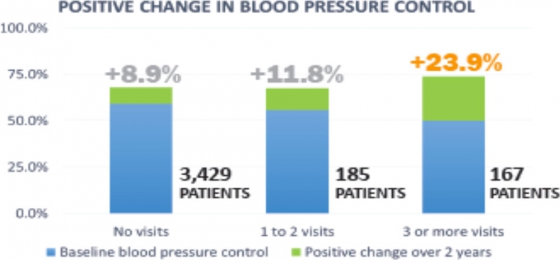Health coaching for wellness in workplace environments has become an accepted practice for employees committed to leading healthier lives. However, within the clinical setting, it is evolving from a “friendly but optional approach” to a solid strategy for capturing at-risk patients. This solid strategy engages patients in their self-care and coordinates their personalized needs with available community resources. Health coaching skills are often woven into the skillset of care managers, care coordinators, and other health navigation providers. It is integrated into the new care management processes adopted under practice transformation (moving from volume to value-based healthcare). With multiple changes taking place in transforming care, it has often been difficult to evaluate the impact of health coaching as a stand-alone strategy.
Many innovative programs are emerging to support practice transformation and best practice care. One positive example of such programs is the Million Hearts and Healthy Hearts in the Heartland (H3) initiative which specifically targets improvements in cardiovascular care.
Throughout 2013-2015, Riverwood Healthcare Center, located in northern Minnesota, participated in the ASTHO Million Hearts Project to improve Hypertension. Riverwood Healthcare Center, a critical access care hospital with three rural health clinics, was one of six partner clinics joining the Minnesota Department of Health, Heart Disease and Stroke Prevention Unit, to identify previously unknown cases of high blood pressure, reduce the number of patients with elevated blood pressure and either maintain or increase those who are in good control. Health coaching, care coordinators or team-based models of care delivery were used to partner directly with the patients. Patient data was collected for two years, 2013-2015.
Riverwood was aggressive in its efforts to both identify new cases of hypertension, and in interventions to bring the identified population under control. Then, a concerted health coaching strategy was integrated into primary care for those identified patients.
The primary care/health coaching model began with a referral from the primary care physician to the health coaching program. The health coach followed the patients until goals were achieved and the patient was ready to “graduate” to a health maintenance program. Coaches closed the referral gap by follow up with their provider throughout this process. Updates were sent directly to each provider via the electronic health record system.
Patient outcomes of the program were significant. 352 patients received health coaching as a component of their primary care for hypertension management. More patients were eligible, but health coaching capacity was limited due to having only one coach available for this project. Patients who completed at least 3 coaching sessions saw a 23.9% improvement in their blood pressure control versus 8.9% who had no health coaching visits (see graphic below).

Patients completing 3 or more coaching visits were only about one-half as likely to be uncontrolled both years, and about twice as likely to move from uncontrolled to controlled (see chart below).

Dan Schletty, MHA, served as health & wellness coach and ACO Program Manager at Riverwood. He was first trained in wellness coaching strategies when working in the insurance industry and later completed Clinical Health Coach® Training Onsite in 2013. “The Clinical Health Coach training assisted me to better understand the clinical side of things. To have the coaching taught and explained in a more realistic, relevant setting in the clinical field was very beneficial.”
Riverwood began their health coaching program from scratch in March 2013. Schletty stated “we didn’t really have a vision before we got onboard with the Clinical Health Coach Training. Now we have created care paths, workflows and I’m plugged right into the Clinic”.
Riverwood has since trained several RN Care Coordinators in health coaching to support patient- centered care and their population health strategies. In 2017, Riverwood joined the Minnesota Rural ACO, a track 1 Medicare Shared Savings Program, which is supported by Caravan Health. In addition, they recently became a certified healthcare home through the Minnesota Department of Health. Specialized training, such as through the Clinical Health Coach® program, support their strategies and mission to improve health by providing high quality, compassionate, and personalized care.
With the recent addition of RN Care Coordinators, Riverwood is now able to follow a tiered approach to population health where the RN Care Coordinators can focus on the top 5-10% high risk patients and enroll them in chronic care management. To support prevention and health outcomes, Riverwood continues to offer health coaching within their primary care clinics, which has been free of charge for all patients since 2013. Over 900 provider referrals have been sent to the health coach for reasons such as hypertension, obesity, stress management and/or tobacco cessation.
Kathy Kunath, RN
Leave a Reply